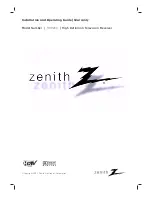
4 - 7
4-2 PLL CIRCUITS
4-2-1 PLL CIRCUIT
A PLL circuit provides stable oscillation of the 1st LO fre-
quencies. The PLL circuit compares the phase of the divid-
ed VCO frequency to the reference frequency. The PLL out-
put frequency is controlled by the divided ratio (N-data) of a
programmable divider.
• A-BAND CIRCUIT (1STAVCO BOARD)
An oscillated signal from one of the 1st VCO circuits
(Q1–Q3, D1–D4) passes through the LO switch (D7–D19)
and buffer amplifiers (IC2, Q8). The amplified signal is
applied to the PLL IC (IC3, pin 11) and is prescaled in the
PLL IC based on the divided ratio (N-data). The PLL IC
detects the out-of-step phase using the reference frequency
and outputs it from pin 5. The output signal is passed
through the loop filter (Q6, Q7), and is then applied to the
one of the 1st VCO circuits as the lock voltage.
• B-BAND CIRCUIT (1STBVCO BOARD)
An oscillated signal from one of the 1st VCO circuits
(Q1–Q5, D1–D5) passes through the LO switch (D7–D10)
and buffer amplifiers (IC2, Q8). The amplified signal is
applied to the PLL IC (IC3, pin 11) and is prescaled in the
PLL IC based on the divided ratio (N-data). The PLL IC
detects the out-of-step phase using the reference frequency
and outputs it from pin 5. The output signal is passed
through the loop filter (Q6, Q7), and is then applied to the
one of the 1st VCO circuits as the lock voltage.
• DOWN CONVERTER PLL CIRCUIT
(DOWNCONV BOARD)
An oscillated signal from the VCO circuit (Q1, D3) is ampli-
fied at the buffer amplifier (Q2). The amplified signal is
applied to the PLL IC (IC4, pin 8) and is prescaled in the PLL
IC based on the divided ratio (N-data). The PLL IC detects
the out-of-step phase using the reference frequency and
outputs it from pin 5. The output signal is passed through the
low-pass filter (L6, C21, C22 and C40), and is then applied
to the one of the 1st VCO circuits as the lock voltage.
4-2-2 REFERENCE OSCILLATOR CIRCUIT
(RF UNIT)
The reference oscillator circuit (X1, Q556, D171) generates
a 19.2 MHz reference frequency which is stabilized within
the temperature range –10˚C (+14˚F) to +60˚C (+140˚F).
The reference frequency is applied to the PLL ICs (refer to
the list below in details) and the FM IF ICs (IC2, pin 2 for A-
BAND circuit: IC17, pin 2 for B-BAND circuit) via the LO
amplifiers (Q540 for A-BAND circuit; Q555 for B-BAND cir-
cuit).
4-2-3 1ST VCO CIRCUITS
(1STAVCO AND 1STBVCO BOARDS)
• A-BAND CIRCUIT (1STAVCO BOARD)
The oscillated signal at 1st A-VCO circuits is applied to the
buffer amplifiers (IC2) via one of the LO switches (D7–D9).
The amplified signal is applied to the 1st mixer circuit (RF
unit; IC1, pin 3) via the LO amplifier (Q9).
The 1st A-VCO circuit is composed of 1AVCO, 2AVCO and
3AVCO. Components and osillating frequences of each cir-
cuits are as follow list.
Shift register
Prescaler
Phase
detector
Loop
filter
REF.
OSC.
REF.
CONT.
Programmable
counter
Programmable
divider
X1
19.2 MHz
to the FM IF IC
RF UNIT
1AVCO
Buffer
Buffer
Buffer
LO
switch
Q9
Q8
IC2
16
17
18
PLLBSTB
IC3 (PLL IC)
PLLDATA
PLLCK
to the 1st mixer circuit
19
5
11
Q1, D1, D2
D7
D8
D9
2AVCO
Q2, D3
3AVCO
Q3, D4
Q6,
Q7
• A-BAND PLL CIRCUIT
BOARD NAME
PLL IC
INPUT
OUTPUT
1STAVCO
IC3
pin 19
pin 5
1STBVCO
IC3
pin 19
pin 5
2NDCVCO
IC1
pin 1
pin 6
2NDDVCO
IC1
pin 1
pin 6
DOWNCONV
IC4
pin 1
pin 5
1st A-VCO
Components
Oscillating freq. (MHz)
1AVCO
Q1, D1 and D2
849.1–899.0999
2AVCO
Q2 and D3
604.1–849.0999
3AVCO
Q3 and D4
429.25–604.0999
















































